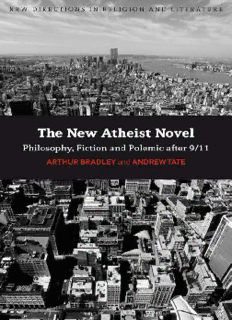
The new atheist novel : fiction, philosophy and polemic after 9/11 PDF
Preview The new atheist novel : fiction, philosophy and polemic after 9/11
THE NEW ATHEIST NOVEL New Directions in Religion and Literature Series Editors: Mark Knight, Roehampton University and Emma Mason, University of Warwick This series aims to showcase new work at the forefront of religion and literature through short studies written by leading and rising scholars in the field. Books will pursue a variety of theoretical approaches as they engage with writing from different religious and literary traditions. Collectively, the series will offer a timely critical intervention to the interdisciplinary crossover between religion and literature, speaking to wider contemporary interests and mapping out new directions for the field in the early twenty-first century. Titles in the series include: Blake. Wordsworth. Religion Jonathan Roberts THE NEW ATHEIST NOVEL FICTION, PHILOSOPHY AND POLEMIC AFTER 9/11 ARTHUR BRADLEY AND ANDREW TATE Continuum International Publishing Group The Tower Building 80 Maiden Lane 11 York Road Suite 704, New York London SE1 7NX NY 10038 www.continuumbooks.com © Arthur Bradley and Andrew Tate 2010 Arthur Bradley and Andrew Tate have asserted their right under the Copyright, Designs and Patents Act, 1988, to be identified as the Author of this work. All rights reserved. No part of this publication may be reproduced or transmitted in any form or by any means, electronic or mechanical, including photocopying, recording, or any information storage or retrieval system, without prior permission in writing from the publishers. British Library Cataloguing-in-Publication Data A catalogue record for this book is available from the British Library. ISBN: 978-0-8264-4429-5 (hardback) 978-0-8264-4629-9 (paperback) Library of Congress Cataloging-in-Publication Data A catalog record for this book is available from the Library of Congress. Typeset by Newgen Imaging Systems Pvt Ltd, Chennai, India Printed and bound in Great Britain by CPI Antony Rowe Ltd, Chippenham, Wiltshire For Bernard Beatty and Michael Wheeler This page intentionally left blank CONTENTS Acknowledgements viii Series Editors’ Preface ix Introduction: The New Atheist Novel 1 Chapter One: Ian McEwan’s End of the World Blues 16 Chapter Two: Martin Amis and the War for Cliché 36 Chapter Three: Philip Pullman’s Republic of Heaven 56 Chapter Four: Salman Rushdie and the Quarrel over God 82 Conclusion: The Post-Atheist Novel 105 Notes 112 Bibliography 125 Index 133 vii ACKNOWLEDGEMENTS First, we are very grateful to Mark Knight and Emma Mason for commissioning this book for the New Directions in Religion and Literature series and to Anna Fleming and Colleen Coalter at Continuum for seeing it through to publication. We would also like to thank Simon Bainbridge, Mike Greaney and Abir Hamdar for taking the time to read parts of the manuscript, offering invaluable feedback and for occasionally saving us from our- selves. Our deepest gratitude goes to our wives, Abir Hamdar and Michaela Robinson-Tate, without whose love and support this book could not have been written. A note on authorship: Arthur Bradley wrote the Introduction, Chapter One and Chapter Two; Andrew Tate wrote Chapters Three and Four while the Conclusion was written by us both. An earlier draft of some of the material presented here was published by Arthur Bradley as ‘The New Atheist Novel: Literature, Religion and Terror in Amis and McEwan’, in The Yearbook of English Studies 2009, special issue on Literature and Religion, ed. by Andrew Tate (New York: MLA, 2009). Finally, we would like to dedicate this book to our first and best academic mentors – Bernard Beatty and Michael Wheeler – with thanks for everything they have taught us over the years. We hope they like it. viii SERIES EDITORS’ PREFACE This series of short monographs seeks to develop the long- established relationship between the disciplines of religion and litera- ture. We posit that the two fields have always been intimately related, aesthetically, formally and theoretically, creating a reciprocal critical awareness framed by the relatively recent theo-literary thinking of figures such as Walter Benjamin, Martin Buber, Hans-Georg Gadamer and Geoffrey Hartman. Committed to reflecting on the question of how these two disciplines continue to interact, we are particularly concerned to redress the marked evasion of this relation- ship within existing scholarship. As Stanley Fish recently declared, religion has the capacity to ‘succeed high theory and race, gender and class as the centre of intellectual energy in academe’. The books in this series are written by a group of critics eager to contribute to and read work intimate with both evolving and new religious and literary debates. Pursuing a variety of theoretical approaches to an array of literary and cultural texts, each study showcases new work on religion and literature while also speaking to wider contemporary concerns with politics, art and philosophy. In doing so, the books collectively map out new directions for the field in the early twenty- first century. Mark Knight Emma Mason ix
Description: